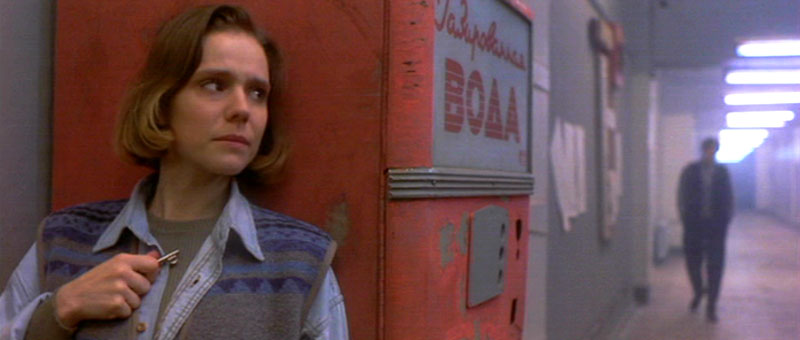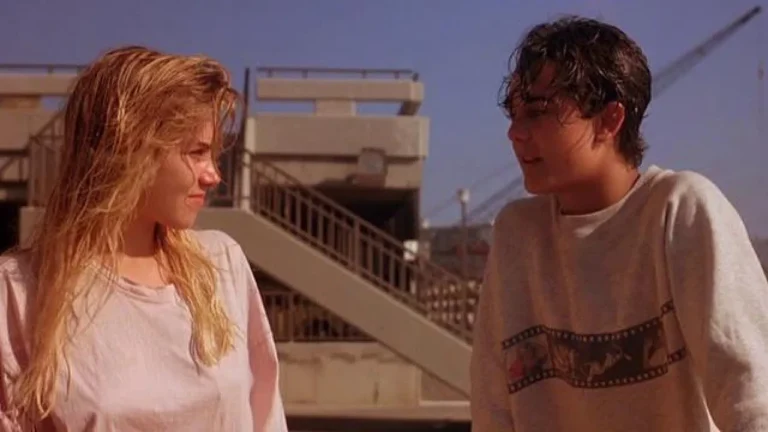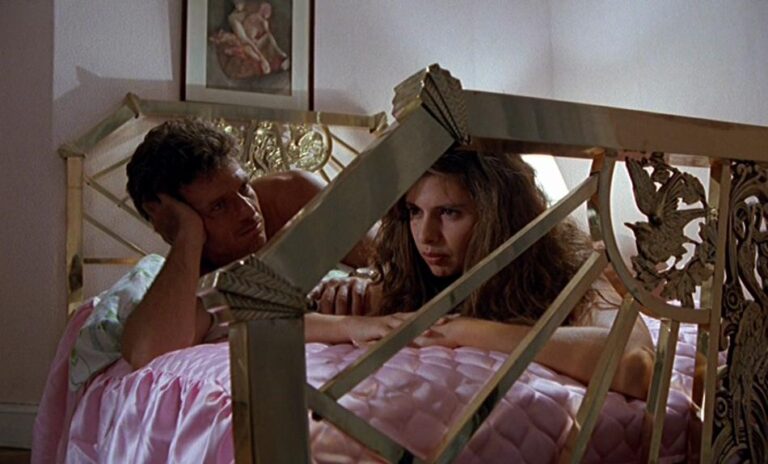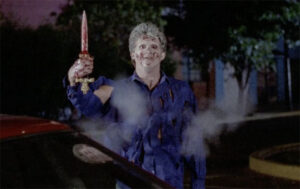![]()
Mute Witness (1995) Directed by Anthony Waller
The neat gag in Anthony Waller’s Mute Witness is to have as the lead character a female makeup artist gore artisan witnessing real gore when she accidentally stumbled upon a snuff shooting. And the clever filmmaking tactic behind this meta exploitation hoax is to fashion a whole taut, nail-biting storyline out of that horrifying event alone.
Billy Hughes (Marina Zudina) is the mute witness, a special effects makeup artist, who is working on the low-budget production of a crummy American slasher film in Moscow. Despite her communication difficulties – especially being mute in a non-English speaking country – her helpful and overprotective sister (Fay Ripley), who is the girlfriend of the director of the film they are working on, assists her in every way she can and practically serves as her translator. After a grueling day of lousy acting and a truncated close-up of the dead victim – the film crew is thrown out of the rented shooting facility for being off the clock – it’s finally time to go home, but Billy returns alone to the location to pick up a piece of equipment for the next day’s shooting. Once inside the dimly-lit place bedecked with miscellaneous movie props, Billy’s bad luck turns implacable. First, she is locked in such an intimidating place, then her muteness prevents her from crying out for help, and ultimately, she goes through the horror of having to witness what first appears to be a benign porno movie then a sickening bloody murder. What happens after that is a masterpiece in edge-of-the-seat filmmaking, and a tour de force in gruesome aesthetics.
There is not a single shot, cut or camera motion that I would dare to change in that mind-boggling first act – it’s flawless – yet, and this is the major complaint I have with Anthony Waller’s film, its perfection expires as soon as the masterful primordial spectacle is over. What comes after that perspiring and nauseatingly intense first act is an indulgent macabre comedy that attempts to be a deconstruction of exploitation cinema, or to be more specific, slasher cinema. While the endeavor is legitimate, I find suicidal the inane decision to sacrifice the irrepressible terror so competently executed only to succumb to the satirical conventions of 90’s horror cinema. The first portion of Mute Witness, and I will never tire of reiterating this, is one of the most astounding horror films of the ’90s. Marina Zudina playing the intelligent but vulnerable Billy Hughes is terrific in that grand sequence of raw cinematic tension; there is nothing more rewarding than watching a piece of horror in which the victim can convey his most visceral fears to the audience with genuine physicality. We experience her fears in a very tangible way.
Mute Witness’ thriller methodology – the storytelling owes something to Wes Craven and John Carpenter, but the camera owes everything to De Palma – works like a rubber band being stretched and stretched to the hilt…unfortunately, it loosens and loosens after its most fundamental piece of tension. Alec Guinness’ hilariously wicked cameo as the secretive “Reaper” is ephemeral but delightful, and the rest of the performances are uniformly sturdy in offering a great balance of drama, humor and horror. But it is undeniably, objectively clear which of these facets they were best at. Mute Witness is the experiment that horror cinema most needed in the 70’s and 80’s, but its formula, released in 1995, is not an idiosyncrasy, it is a convention; it came too late. A great practical idea that at first feels so vital, dangerously primitive and formidable, then is wasted and looks pretentiously technical and theoretical.
The narrative twists rather than shocking surprises or shrewd storytelling strategies are at times overdone, at others hokey, and at the end of the day a sort of deus ex machina. Are they entertaining? Absolutely, but they are still contrived. Having said that, the film remains pivotal, for its unerring first act – one of the finest I’ve seen in the genre – and for its farcical rumination on the controversy surrounding the issue of fictional and real violence.









